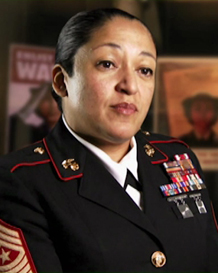
Laura Brown
Sergeant Major Laura Brown is the first female Base Sergeant Major in the history of Quantico Marine Corps base. She also served in Iraq, supporting combat troops, and was responsible for the Fallen Angels program.
QUESTION: Why did you join the Marines?
LAURA BROWN: Well, it was April 1984, and we were going to graduate in May or June, I
can’t remember what month. I knew I was not going to go to college, just because there was no
college money. I also knew that I wasn’t going to get married, you know, in my culture that’s
what you do. You find a husband and you marry him, but I already knew my personality even
then, it wasn’t going to work for me. So I joined the Marine Corps because I was sitting in class
in April and one of my friends walked in and I said, how come you haven’t been here, and he
said I went to go see my recruiter. I said what is that? Then he explained what the recruiter was
and I asked him where he was. So I went to go see what the recruiter was about. That’s why I
joined because that was my out, I could leave home.
QUESTION: When you joined, what was the attitude with women serving in the Marine Corps
in a male dominant profession?
LAURA BROWN: I thought about that question a lot. I get asked that question a lot over the
years, and I really have to say that, you know, when you’re 19 you don’t think about those
things. You’re invincible, so you don’t really realize that you’re this girl going into the male
dominated organization. You just know what you’re good at and I also had the good fortune to
go into an MOS, my military occupational specialty, that is financed, so, there’s a high
preponderance of women in that MOS. So it didn’t dawn on me. I certainly knew that the
Marine Corps was very male dominated but that didn’t affect me the way I realize it now.
Maturity makes you see things differently.
QUESTION: WWII slogan Free a Man to Fight, what affect did it have on the Marine Corps?
LAURA BROWN: Well, because I went to a WWII veteran’s birthday last Friday at the nursing
home, I think that back in those days the affect that it had was it afforded women an opportunity
to serve for the very first time. So I think that if you are a young lady in that generation, it
certainly opened an opportunity for you. I think the promotions back than were Rosey to the
Riveter. So it afforded women an opportunity to do something other than be somebody’s wife,
or be a nurse, it allowed you to come into the military and serve your country.
QUESTION: What jobs did they do?
LAURA BROWN: Predominantly they were nurses. They were women that worked in the
factories so that our male counterpart could go forward, because they weren’t authorized to go
forward back in the 40s. They worked on the aircrafts, they worked on sewing parachutes, again,
part of that Rosey the Riveter concept. There was a lot of administrative typists, type clerks,
those kind of job descriptions.


